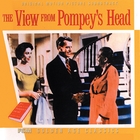|
|
 |
 |
| Return to FSM CDs |
Previous CD | Next CD |
| The View From Pompey's Head/Blue Denim (1955/1959) |
 |
| Music by Elmer Bernstein, Bernard Herrmann |
 |
 |
|
|
| Click to enlarge images. |
 |
|
|
| Line: Golden Age |
| CD Release:
November 2001
|
| Catalog #: Vol. 4, No. 15 |
| # of Discs: 1 |
|
 |
This Golden Age Classics CD showcases the talents of two of cinema's greatest composers, Elmer Bernstein and Bernard Herrmann. The CD combines two previously unreleased scores from the 1950s for socially relevant films directed by Philip Dunne: The View from Pompey's Head and Blue Denim.
The View from Pompey's Head (1955) has nothing to do with Mount Vesuvius, but is instead a slice of Southern Americana touching upon racism, class prejudice and adultery. Richard Egan plays a lawyer who returns to his hometown to sort out a racially oriented mystery and finds himself reunited with an old flame, played by Dana Wynter. Writer/producer/director Dunne asked Bernard Herrmann to score the film, but Herrmann was involved with Alfred Hitchcock's The Man Who Knew Too Much and suggested young Elmer Bernstein as an alternative.
Only five years into his Hollywood career, Bernstein triumphed with his first romantic score, a rich, melodic and American work with a memorable love theme and haunting passages. The score features the touchstones of Bernstein's best dramatic writing, evoking melancholy and nostalgia as well as joy and warmth. In many ways it was the predecessor to his lush score to From the Terrace (FSMCD Vol. 3, No. 8).
In 1959 Dunne directed Blue Denim, a controversial film starring Brandon de Wilde and Carol Lynley as teenagers facing an unwanted pregnancy. This time Herrmann was available and wrote a "Baby Vertigo" type of score reminiscent of his anguished romantic writing for Hitchcock, with yearning, Wagnerian passages for strings. Perhaps overbearing for the film, it has long been a fascinating curio in Herrmann's career (with several unused cues) and is a powerful score with many elegiac passages written amidst North by Northwest, Twilight Zone's first season and Journey to the Center of the Earth.
Both Pompey's Head and Blue Denim are remixed in stereo from the original multitrack sessions; the CD features liner notes by Herrmann archivist Christopher Husted. One director, two forgotten films, and two legendary composers—that is the basis for this doubleheader of great film music with no shortage of personality. |
 |
 |
 |
| Elmer Bernstein Scores on FSM |
 |
 |
 |
|
 |
| About the Composer |
 |
Elmer Bernstein (1922–2004) had a Hollywood career that lasted over a half a century; invented and reinvented himself as a composer across several genres (jazz, epics, westerns, comedies and adult dramas); and scored more than a few Hollywood classics—The Ten Commandments, The Magnificent Seven, To Kill a Mockingbird, The Great Escape and Airplane! to name but five. FSM has released a dozen of his scores and counting, but the most popular may be Heavy Metal (1981)—don't be fooled by the title, it's Elmer's "Star Wars." In addition to his prolific work as a composer, Bernstein was a tireless champion of film music as an art form, serving on the boards of several professional organizations and in the 1970s recording his own LP series of classic Hollywood scores, Elmer Bernstein's Film Music Collection, released by FSM as a 12-CD box set. IMDB |
 |
 |
 |

|
 |
|
 |
 |
 |
 |
 |
 |
| Instruments/Musicians |
| Click on each musician name for more credits |
|
For more specific musician lists for the scores on this album, go here: |
| Blue Denim |
| The View from Pompey's Head |
|
|
|
Leader (Conductor):
Bernard Herrmann, Lionel Newman
Violin:
Victor Arno, Sol Babitz, Israel Baker, Victor Bay, George Berres, Henry Camusi, Joachim Chassman, Harold Dicterow, Kurt Dieterle, Adolph DiTullio, David Frisina, Werner L. Gebauer, James Getzoff, Anatol Kaminsky, Louis Kaufman, Marvin Limonick, Sid Lippman, Paul Lowenkron, Lewis Main, Jr., Alexander Murray, Irma W. Neumann, Lou Raderman, David Selmont, Eudice Shapiro-Kast, Paul C. Shure, Felix Slatkin, Leon Trebacz, Dorothy M. Wade (Sushel), Heimann Weinstine
Viola:
Myer Bello, Norman Botnick, Alvin Dinkin, Harry A. Hyams, Maxine Johnson, Virginia Majewski, Alex Neiman, Robert Ostrowsky, Sven Reher, Sanford Schonbach
Cello:
Naoum Benditzky, Joseph Coppin, Joseph DiTullio, Adolph Frezin, Virgil Gates, Ossip Giskin, Leonard Krupnick, Kurt Reher
Bass:
C. Magdelano Rivera, Meyer (Mike) Rubin, Murray Shapinsky, Kenneth Winstead
Flute:
Arthur Hoberman, Luella Howard, Sterling D. Smith
Oboe:
William Kosinski, Gordon Pope
Clarinet:
Russell Cheever, Morris Crawford, Charles Gentry, Abe Most, William A. Ulyate
Bassoon:
Don Christlieb, Arthur Fleming
French Horn:
John W. "Jack" Cave, James A. Decker, Vincent N. DeRosa, Fred Fox, Alan I. Robinson, Harry Schmidt
Trumpet:
Frank Beach, John Clyman, Robert Fowler
Trombone:
Marlo Imes, Ray Klein, John Tranchitella, Bill Williams (aka George Davenport)
Tuba:
Clarence Karella
Piano:
James G. Rowles, Urban Thielmann
Guitar:
Vito Mumolo
Harp:
Anne Stockton (Mason), Kathryn M. Thompson Penney
Drums:
Richard Cornell, Paul DeDroit, Harold L. "Hal" Rees
Orchestrator:
Ed Powell
Arranger:
Earle H. Hagen
Orchestra Manager:
Simon Waronker
Copyist:
Gene Bren, Walter Brenner, Allan Campbell, Aristide G. Coccaro, Harriet B. Crawford, Wolfgang Fraenkel, W. D. Garlock, George Gordon, Wally Heglin, Elton A. Koehler, Albert Lisi, Jack McTaggart, Joe Petroni, Edgar Roemheld, Jr., Ernest Rosecrans, Paul Sprosty, Harry Stone, Wallace Wheeler, Bill Williams (aka George Davenport)
Librarian:
Fred Combattente
|
 |
|
|
 |
 |
|
|
|
|

















